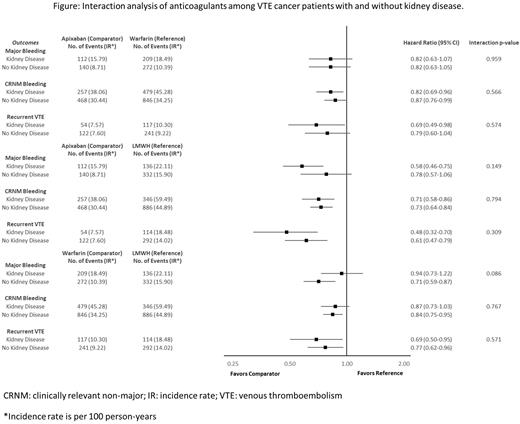Abstract

Introduction: Cancer patients with kidney disease are at increased risk for having venous thromboembolism (VTE) and bleeding than those without kidney disease. There is a lack of evidence about the effectiveness and safety of anticoagulants in cancer patients with VTE and kidney disease.
Purpose: To evaluate the effectiveness and safety of different anticoagulants among VTE cancer patients with or without kidney disease.
Methods: Adult VTE patients with any active cancer identified between 01SEP2014 and 29SEP2020 who initiated apixaban, low molecular weight heparin (LMWH), or warfarin within 30-days following a VTE were identified from 4 commercial databases and Medicare database. Cancer status was identified in the 6-months prior through 30-days post VTE. Kidney disease (chronic kidney disease plus acute kidney disease) was defined based on diagnosis codes and was identified in the 6-months prior to VTE. Stabilized inverse probability treatment weighting (IPTW) was used to balance patient characteristics between treatment cohorts. After IPTW, VTE cancer patients were stratified by those with and without kidney disease. Incidence rates (IRs) were determined for major bleeding (MB), clinically relevant non-major (CRNM) bleeding and recurrent VTE events within the first 6-months of follow-up. Cox proportional hazard models were used to evaluate interactions between treatments (apixaban or warfarin or LMWH) and kidney disease status on the risk of MB, CRNM bleeding and recurrent VTE events. Interactions with P<0.10 were considered statistically significant.
Results: Among the 30,586 VTE cancer patients who met all study criteria 8,858 (29.0%) had kidney disease. Use of warfarin, LMWH and apixaban was similar between those with kidney disease (40.2%, 31.6%, and 28.1%) and without kidney disease (36.9%, 38.6%, and 24.4%, respectively). After IPTW, patient characteristics were balanced between treatment cohorts. Analyses stratified by kidney disease status showed that treatment effects were not significantly different for patients with and without kidney disease (figure). The incidence rates of major bleeding, CRNM bleeding and recurrent VTE events trended lower in the apixaban cohort compared to warfarin or LMWH for both kidney disease and no kidney disease patients (figure). Generally, there were no significant interactions between kidney disease status and treatments on any of the outcomes (figure).
Conclusion: Effects of apixaban, LMWH and warfarin on recurrent VTE and bleeding were generally consistent in VTE cancer patients with or without kidney disease. Additional research is needed to identify optimal anticoagulant treatment strategy for VTE cancer patients with kidney disease.
Disclosures
Cohen:BMS/Pfizer: Consultancy, Honoraria, Research Funding, Speakers Bureau; Alexion/Astra Zeneca: Consultancy, Honoraria, Research Funding, Speakers Bureau; Bayer AG: Consultancy, Honoraria, Speakers Bureau. Noxon:STATinMED, LLC: Current Employment, Other: STATinMED, LLC is a paid consultant to Pfizer and Bristol Myers Squibb in connection to the development of this study. Dhamane:Pfizer: Current Employment. Shah:Bristol-Myers Squibb Company: Other: I am a paid employee of STATinMED, LLC which is a paid consultant to Bristol-Myers Squibb Company.; Pfizer, Inc.: Other: I am a paid employee of STATinMED, LLC which is a paid consultant to Pfizer, Inc.. Hines:Pfizer, Inc.: Current Employment. Alfred:Pfizer, Inc.: Current Employment. Chaves:Pfizer SLU: Current Employment. Luo:Pfizer, Inc.: Current Employment.
Author notes
 This icon denotes a clinically relevant abstract
This icon denotes a clinically relevant abstract
Asterisk with author names denotes non-ASH members.


This feature is available to Subscribers Only
Sign In or Create an Account Close Modal